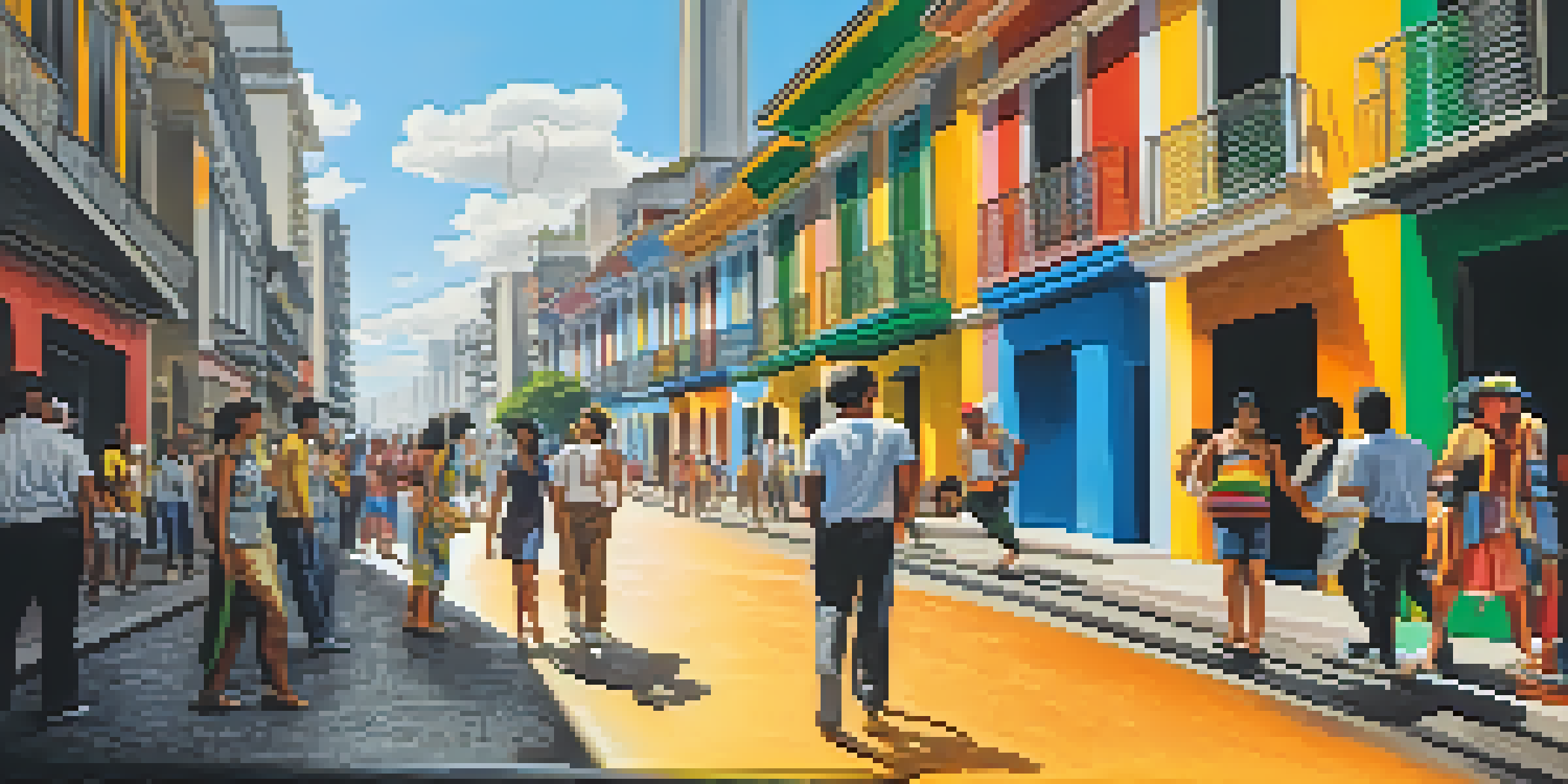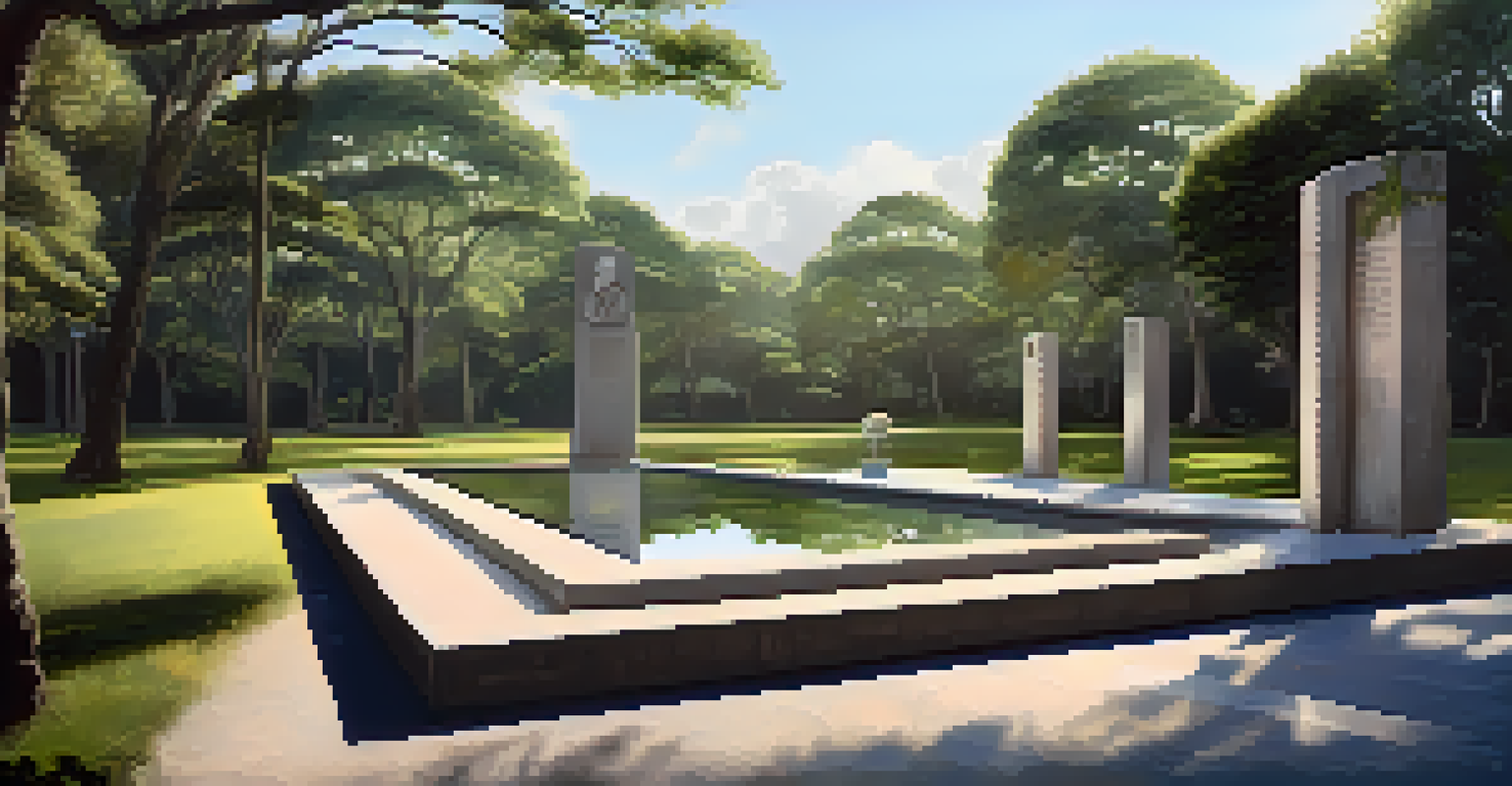Brazil's Revolutionary History: Guided Tours of Key Events

Understanding Brazil's Revolutionary Roots
Brazil's revolutionary history is rich and complex, shaped by a variety of social, political, and economic factors. The country’s journey toward independence and beyond has been marked by significant events that have left a lasting impact on its culture and identity. To truly appreciate Brazil's evolution, it's essential to understand the early struggles for independence from Portugal in the early 19th century.
Freedom is never given; it is won.
These early revolutionary movements set the stage for Brazil's unique path. Unlike many other Latin American countries, Brazil's transition to independence in 1822 was relatively peaceful, largely due to the role played by Dom Pedro I. This notable event is often a focal point on guided tours that aim to educate visitors on the nation's formative years.
As we delve deeper into Brazil's revolutionary history, we see that it is not solely about independence. The complexities of social movements, including abolition and land reform, further illustrate why guided tours of these historical sites can be both enlightening and inspiring.
The Impact of the Abolition of Slavery
The abolition of slavery in Brazil in 1888 was a monumental event that reshaped the nation. Brazil was one of the last countries in the Americas to abolish slavery, and this decision came after years of struggle and resistance from enslaved people and abolitionists alike. Guided tours often highlight the stories of these brave individuals who fought for their freedom and rights.

Visiting sites associated with the abolition movement can deepen your understanding of this critical chapter. Locations such as the Museum of the Abolition and the Memorial to the Resistance in São Paulo serve as poignant reminders of the past. They showcase how the abolitionist movement intertwined with the broader revolutionary spirit of the time.
Brazil's Unique Path to Independence
Brazil's relatively peaceful independence in 1822, led by Dom Pedro I, set the stage for its distinctive revolutionary journey.
Moreover, the legacy of slavery's end continues to influence Brazilian society today. Engaging with this history through guided tours can spark important conversations about race, equality, and the ongoing quest for social justice in Brazil.
The Role of the 1930 Revolution
The 1930 Revolution marked a significant turning point in Brazil's political landscape. This revolution was spurred by discontent with the existing political order and aimed to address the needs of the Brazilian populace. Guided tours often take participants to key locations where pivotal events unfolded, allowing them to visualize the fervor of the time.
History is not a burden on the memory but an illumination of the soul.
One of the most notable figures from this revolution was Getúlio Vargas, who became president and implemented numerous reforms. His policies aimed to modernize Brazil and improve the lives of its citizens. Exploring places where Vargas made his mark provides context for understanding his impact on the country’s development.
The 1930 Revolution also laid the groundwork for future political movements. By visiting historical sites tied to this era, tourists can grasp how these events shaped Brazil's trajectory and contributed to its ongoing struggle for democracy.
Exploring the Brazilian Military Dictatorship
The Brazilian military dictatorship from 1964 to 1985 was a dark chapter in the nation’s history, characterized by repression and human rights abuses. This period saw the suspension of civil liberties and the persecution of dissenters, making it a crucial topic for guided tours focused on revolutionary history. Understanding this era is essential to comprehend the resilience of the Brazilian people.
Guided tours often include visits to memorials and museums that honor the victims of the dictatorship. These sites serve not only as reminders of the past but also as platforms for reflection and healing. Learning about the stories of those who resisted can be both sobering and inspiring.
Abolition's Lasting Social Impact
The abolition of slavery in 1888 marked a crucial turning point, influencing contemporary discussions around race and equality in Brazil.
Moreover, discussing the transition to democracy after the dictatorship offers a hopeful perspective. Tours that address these historical complexities can help participants appreciate the struggles for freedom and the importance of safeguarding democracy today.
The Cultural Revolution and Its Legacy
Beyond political revolutions, Brazil has also experienced significant cultural revolutions that have shaped its identity. The Tropicália movement of the late 1960s, for example, fused music, art, and politics, challenging societal norms and promoting creative expression. Guided tours often explore how this cultural revolution intertwined with Brazil's broader revolutionary narrative.
Cultural sites reflecting this movement can be found throughout cities like São Paulo and Rio de Janeiro. Visiting galleries, theaters, and music venues that played a role in the Tropicália movement helps to paint a fuller picture of Brazil’s revolutionary spirit. These experiences highlight the power of art as a form of resistance and social commentary.
Today, the legacy of these cultural movements continues to inspire new generations of artists and activists. Engaging with this aspect of Brazil's history through guided tours can foster a deeper appreciation for the country's vibrant cultural landscape.
Experiencing Revolutionary History Through Local Tours
Participating in guided tours that focus on Brazil's revolutionary history offers a unique opportunity to connect with the past. Local guides often share personal anecdotes and insights that bring historical events to life, making the experience more relatable and engaging. These tours can vary widely, catering to different interests and levels of historical knowledge.
From walking tours in historic neighborhoods to immersive experiences at museums, there’s something for everyone. Visitors can choose tours that focus on specific events, such as the independence movement or the dictatorship era, allowing them to tailor their experience according to their interests. This personalized approach enhances the learning experience.
Cultural Movements as Resistance
Cultural revolutions like Tropicália in the late 1960s played a significant role in shaping Brazil's identity and promoting artistic expression as a form of resistance.
Additionally, engaging with local communities during these tours fosters a sense of connection to Brazil's rich history. By understanding the local context and the stories behind key events, visitors can appreciate the complexities of Brazil's revolutionary narrative in a meaningful way.
Conclusion: Embracing Brazil's Revolutionary Spirit
Exploring Brazil's revolutionary history through guided tours is not just about learning facts; it's about embracing the spirit of a nation that has continually fought for change and justice. Each event in the timeline, from independence to cultural revolutions, adds layers to Brazil’s identity. These tours offer insights into the resilience of the Brazilian people and the complexities of their journey.
As you walk through the streets where history was made, you'll find that the stories of the past are not just relics but living narratives that resonate today. They inspire discussions on freedom, equality, and the ongoing efforts to create a better society.

Ultimately, engaging with Brazil's revolutionary history through guided tours fosters a deeper understanding of the country's present and future. It encourages visitors to reflect on their own values and the importance of striving for a just and equitable world.